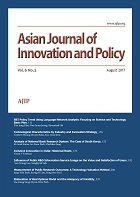 ISSN : 2287-1608
ISSN : 2287-1608
Technological Innovation in Public Education in the Era of COVID-19: Focusing on Distance Education Policy in South Korea
Abstract
As the COVID-19 continues spreading, Korea’s Ministry of Education (MOE) announced that all public schools, including elementary, middle, and high schools, must begin on April 9, 2020, via online teaching for the first time in the nation’s history. There were opposite views among educators regarding the unprecedented attempt to start school online. This study intends to analyze the strategies and policies of distance learning in the public education sector using the experiences in Korea, which has been dealing with the COVID-19 pandemic over the past six months, and thus presents educational implications that may be of interest other countries in the post-COVID-19 era. This study first conceptualized the distance education policy in two domains: technological infrastructure and technological teaching and learning, and then examined what specific policies have supported distance education in school settings. For the analysis of policies supporting distance education in Korea, this study analyzed the relevant documents that include the annual plan and press release uploaded on the website of MOE from early March until early August. Accordingly, 13 documents that contain the distance education policy were analyzed in this study. To provide equal opportunities for all students and ensure fair resource allocations, technological inequality should be discussed in the context of educational inequality. Finally, this study looks at how strategies and policies could be related to educational equality and equity.
- keywords
- Distance education, Technological innovation, Educational innovation, Equality and Equity, COVID-19
Reference
Ball, S. J. (1993). What is policy? Texts, trajectories and toolboxes. Discourse: studies in the cultural politics of education, 13(2), 10-17.
Hargreaves, Andy (2020). Two panoramas for change beyond the pandemic. Presentation via 2020 Seoul Education webinar international. Retrieved from https://www.youtube.com/watch?v=Dvt9vlAaKoE
Hong, J. (2020). Online education and the possibility in the post-COVID19. Presentation via 2020 Seoul Education webinar international. Retrieved from https://www. youtube.com/watch?v=Dvt9vlAaKoE
Jandrić, P. (2020). Deschooling. In M. Peters (Ed.), Encyclopedia of teacher education. Singapore: Springer. Retrieved from https://doi.org/10.1007/978-981-13-1179-6_ 115-1.
Rawls, John (1971). A theory of Justice. Harvard University Press.
Ministry of Education (2020). Establishment of operational standards for systematic remote classes. Press release. Retrieved from https://moe.go.kr/boardCnts/view.do? boardID=294&boardSeq=80131&lev=0&searchType=null&statusYN=W&page=23&s=moe&m=020402&opType=N
Mundy, K. and Hares, S. (2020). Equity-focused approaches to learning loss during COVID-19. Retrieved from https://www.cgdev.org/blog/equity-focused-approaches-learning-loss-during-covid-19
NewsDigm (2020). Ministry of Education establishes 'Remote Education Future Education Center' in preparation for the post-corona era. Retrieved from http://www.newsdigm.com/19806
Reimer, F. M. and Achleicher, A. (2020). A framework to guide an education response to the COVID-19 pandemic of 2020. OECD. Retrieved from https://read.oecd-ilibrary.org/view/?ref=126_126988-t63lxosohs&title=A-framework-to-guide-an-education-response-to-the-Covid-19-Pandemic-of-2020
Teräs, M., Suoranta, J., Teräs, H., and Curcher, M. (2020). Post-Covid-19 Education and Education Technology ‘Solutionism’: a Seller’s Market. Postdigital Science and Education. Retrieved from https://link.springer.com/content/pdf/10.1007/s42438-020-00164-x.pdf
UNESCO. (2020). COVID-19 educational disruption and response. UNESCO Retrieved from https://en.unesco.org/covid19/educationresponse. Accessed 22 April 2020.
Waterford (2019). Why Understanding Equity vs Equality in Schools Can Help You Create an Inclusive Classroom. Retrieved from https://www.waterford.org/ education/equity-vs-equality-in-education/
- Downloaded
- Viewed
- 0KCI Citations
- 0WOS Citations

